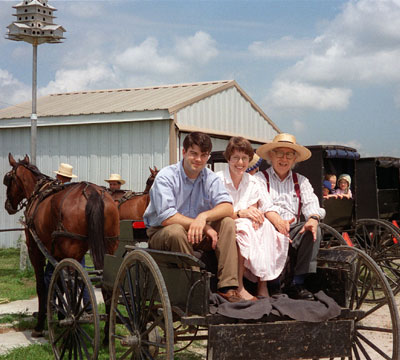NIH Family Members Giving Back: Charlotte Phillips
Posted on by Dr. Francis Collins

Caption: Charlotte Phillips during a visit to a Missouri Mennonite community.
Credit: Richard Hillman
At 1 a.m., most people are fast asleep in their beds. But Charlotte Phillips sometimes finds herself up at that odd hour, waiting anxiously in a deserted Missouri parking lot far from her home. Phillips drives there to meet a contact for a very special delivery: a packet of cheek swabs and blood samples from a newborn Mennonite baby at risk of a life-threatening genetic condition called maple syrup urine disease (MSUD).
For more than two decades, Phillips, an NIH grantee at the University of Missouri, Columbia, has volunteered to ensure that the DNA in these swabs and samples is tested for MSUD within hours of a baby’s birth. If found to be positive for the condition, the baby can receive a needed special formula. Without it, the baby would suffer brain damage within days from its inability to break down amino acids in protein-rich foods, including breast milk and standard infant formula. Hurrying off at a moment’s notice isn’t always convenient, but Phillips, who is not Mennonite, feels a personal calling to do it. She wouldn’t want any babies to die.
MSUD is named for the sweet smell associated with the urine of people left untreated for the condition. The lifelong condition is exceedingly rare, affecting about 1 in 185,000 infants [1]. But, it’s relatively common among Old Order Mennonites, affecting about 1 in 380 infants. That’s because many Mennonites carry one copy of the mutated gene, meaning they won’t develop MSUD but can pass it on to their children if their spouse is also a carrier.
Getting newborns tested and treated promptly for MSUD is a challenge for Old Order Mennonites in Missouri. Childbirth often occurs at home or in local birthing clinics situated in their close-knit rural communities, with only midwives to help. They also would have to rely on horses and buggies to travel long distances to hospitals and often don’t have health insurance.
In the early 1990s, after learning of two Mennonite babies that almost died from complications of MSUD, Phillips decided to help develop a test for the newborns. She did so even though her research expertise is in inherited connective tissue disorders, not metabolic diseases like MSUD.
Since then, Phillips has been working for free with Mennonite communities across the state to ensure that all married couples have a chance to be tested for a MSUD gene mutation. When husband and wife are both found to be carriers, the couple knows what must be done immediately after a birth: collect a DNA sample from the baby and rush it to Phillips or another member of her team.
Phillips has always found a way to scrape together funds from small donations and grants to cover the testing costs. At first, Phillips ran the test herself on a standard polymerase chain reaction (PCR) machine, which amplifies DNA segments of diagnostic interest. But it took 12 hours from start to finish. Although Philips has never lost a baby to MSUD, she’s had a close call. One couple didn’t get the DNA sample to her until their baby was already a day old. Add 12 more hours for testing, and the baby’s blood amino acid levels were already creeping up when Phillips contacted the parents with the results.
After that episode, Phillips knew she needed to get the test done faster. These days, she relies on a local, family-run genetic testing company called GeneTrait Laboratories. With its help, Phillips can get an answer in about four or five hours—occasionally even sooner. Phillips says the testing has always been a team effort, with everyone dropping whatever it was they were doing to help a baby or family.
When Phillips reflects on her academic career, she feels fortunate to have taught and mentored so many outstanding students, while also conducting important medical research to help others. But she says it’s been an extra-special privilege to serve the Mennonites and do for them what they couldn’t do for themselves. She’s says it’s a great feeling to be able “to point to four children who will lead full lives” because of all those trips to parking lots far from her home.
Reference:
[1] Maple Syrup Urine Disease Frequency. Genetics Home Reference.
Links:
Charlotte Phillips (University of Missouri, Columbia)
Maple Syrup Urine Disease (National Center for Advancing Translational Sciences/NIH)
GeneTrait Laboratories (Columbia, MO)
Share this:
- Click to share on LinkedIn (Opens in new window)
- Click to share on Pinterest (Opens in new window)
- Click to share on Tumblr (Opens in new window)
- Click to share on Reddit (Opens in new window)
- Click to share on Telegram (Opens in new window)
- Click to share on WhatsApp (Opens in new window)
- Click to print (Opens in new window)
Posted In: Health, Science, Tribute
Tags: DNA test, genetic testing, genetics, Maple Syrup Urine Disease, Mennonites, metabolic disease, MSUD, pediatrics, rare diseases, volunteerism, volunteers

Thank you for sharing.
Great to see happening
nice and awesome…